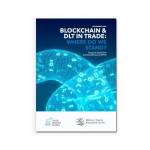Advantages of blockchain and DLT for MSME access to finance

Content
DLT has tremendous potential to facilitate the digitalisation of trade finance and brings several key benefits to the parties involved.
Among many others, these benefits include:
- the tokenisation of assets (including collaterals),
- the possibility of transferring digital assets,
- preventing double-spending and forgery,
- rendering payments and other processes automatic,
- reducing paper waste,
- introducing a new approach to identity management.
DLT can empower individuals and companies around the globe to make transactions more efficient, economical, and rapid while retaining a high level of security.
It has the potential to digitalise trade and trade finance processes and many experts advocate that it could be to trade and trade finance transactions what the internet has been to communication.
With such widespread benefits, it is no surprise that such a vast number of DLT platforms and projects have emerged in trade.
While the number of active projects fluctuates constantly as new initiatives enter the fray and others are either acquired or disappear entirely, according to the TFG and WTO co-publication DLT in Trade: where do we stand? there are at least 44 DLT projects currently active, using NLP, and other tech.
Trust, transparency, and traceability
When it comes specifically to MSME financing, DLT brings a holy trinity of value: trust, transparency, and traceability.
These benefits can make it easier for MSMEs to build a digital credit history and for banks to assess MSME creditworthiness.
Some DLT projects are focused specifically on serving MSME firms, amplifying the benefits of DLT for smaller firms that will be able to access solutions tailored more specifically to their needs.
The increased transparency provided by DLT can also make it easier for Tier 2 suppliers and lower which are often small businesses, to access finance.
Common supply chain finance solutions are usually only available to established Tier 1 suppliers, which are able to convince their big corporate buyers of their trustworthiness.
By enhancing visibility into deeper-tier suppliers, DLT can make their access to finance easier.
Bypassing traditional finance processes
Another potential benefit of DLT for MSMEs is that it can allow them to bypass traditional processes or sources of finance.
DLT allows companies and individuals around the globe to make transactions on a direct, peer-to-peer basis, without the need to go through traditional banks.
In doing so, DLT allows MSMEs that do not have access to bank financing to access the international trade market through other means.
Some platforms on the market leverage DLT to enable MSMEs to build a credit history and access the services of various fintech companies, thereby bypassing banks.
Digital identity
A global digital identity system can be a powerful tool to help MSMEs access finance.
DLT can break existing identity siloes by making it possible for entities to manage their identities themselves.
This can be done using self-sovereign identities (SSIs) or legal entity identifiers (LEIs), which provide the capacity to own and control one’s digital identity without the intervention of administrative authorities.
The technology can also help manage related verifiable credentials and their usage throughout global supply chains, improving the verification of companies’ credentials.
In doing so, DLT makes it easier for MSMEs to build an identity and reduce the costs related to supplier verification processes which can weigh heavily on small businesses.
Ensuring interoperability between these different systems is essential to enable the development of a global digital identity system.
It is critical that the various solutions developed integrate globally accepted standards such as the decentralised identifier (DID) developed by the World Wide Web Consortium (W3C).
A platform mindset
The most frequent use of DLT is in platforms, the members of which conduct transactions using a common rulebook.
On such platforms, the distributed ledger is a “holder of the truth” for all messages and transactions between members.
This not only provides transparency and security for its members but also gives the platform’s members clear data definitions and a defined transaction process.
The use of DLT allows various costs that can weigh heavily on trade transactions and indirectly impact the smaller players, from coordination costs to processing and verification costs, to be slashed.
The idea of open platforms is growing in popularity and will also assist in delivering benefits to MSMEs.
Promoting worldwide supply chain standards
As work in the trade finance DLT sphere has continued to progress, another unforeseen benefit has also emerged: DLT has the capacity to incentivise an internal industry push to address the challenges of standardisation.
Different DLT platforms have different data standards and communication protocols, which limits their ability to talk to each other.
This “digital island” problem has fomented the need to develop a set of globally accepted standards spanning the entire supply chain.
Increased pressure to develop trade standards, if executed, would provide immense benefits to all traders, including the smaller traders, and would support the wider adoption of nearly all of the digital technologies discussed in this publication.
- More About Blockchain
- Featured Insights















